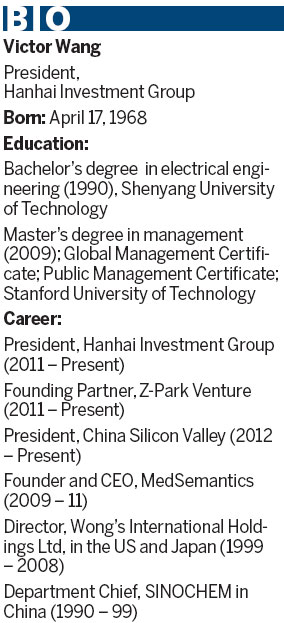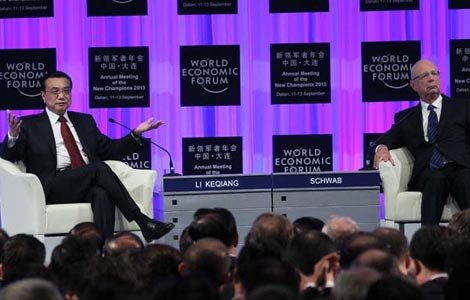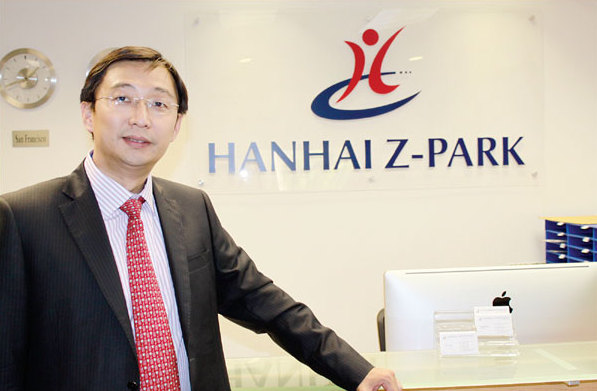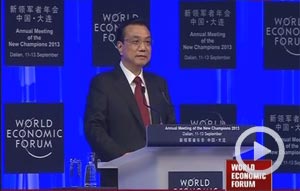Hanhai: Marching to globalization
Updated: 2013-09-13 11:15
By Zhang Qidong in San Francisco (China Daily)
|
||||||||
Victor Wang, president of Hanhai Investment Group, has a grand plan for the company's globalization.
With an 80,000 square-foot, high-tech research building in Silicon Valley that was purchased for more than $10 million in 2012, and a 120,000 square-foot US-China Life Science park that opened in 2013 at a cost of more than $20 million just for the building, Wang is looking to acquire a third green-energy science park by the end of 2014 to bring together resources from across the world for startups and cross-border business development. All of that has been accomplished since June 20 last year when he became president.
"To position Hanhai with full-fledged business scope is important for us and green energy is a highly desirable field that both US and Chinese businesses are looking into today. I'd like to see our platform combine the right channels for enterprises and startups in research, life science and green energy into one," said Wang.
According to Wang, more than 80 companies are being incubated at Hanhai's US research headquarters in San Jose, California, and he estimated that number will increase to 100 by the end of the year. As part of its international expansion, the company has just opened an office in Munich, Germany, and plans to set up offices in Toronto and Los Angeles.
|
Victor Wang's Hanhai Investment Group has incubated 80 companies in its research headquarters in San Jose, a number which is expected to grow to 100 this year. Zhang Qidong / China Daily |
The primary task of all three science parks is to act as an incubator for startups. Wang said an initial angel investment fund of $5 million has been created and investments have been made in more than 10 startups, most in the area of information technology.
Hanhai also is actively seeking new participants when it comes to incubation. The company hosts a continuing series of events for inviduals who have a startup idea so they can present it, or for a company that has a business plan to discuss. The company can provide potential startups with a pool of private investors, venture capitalists, attorneys, accountants and tax experts. In addition, Wang said a "startup university" series is held every week with addresses by various professionals from such fields as tax, law and entrepreneurship.
A graduate of Stanford University's Graduate School of Business, Wang joined Hanhai last year when Chairman Wang Hanguang of Hanhai Zhiye Investment in China was seeking a president for its US subsidiary.
"All I ever wanted to do was to be a bridge between the US and China in business and culture development, and I knew it was the perfect opportunity when it knocked at my door," said Wang.
Working almost seven days a week with a staff of 12 at the company's San Jose headquarters, Wang said he rarely takes time off because he is booked with events during the week and almost every weekend.

"We did not do much marketing, but more and more people in Silicon Valley know about us, probably because we practically have events and activities on our schedule almost every day," he said.
Other than Hanhai's own efforts, Wang attributes the success of recruiting startups to the Chunhui Bei Competition, an annual event in China and the US that is hosted by the Chinese Ministry of Education and Ministry of Science, and sponsored by Hanhai, UCAHP and the Chinese consulate general in San Francisco.
This year marks the eighth anniversary of the competition, and its US competition will be held on Sept 15 at the Santa Clara Convention Center. Winners will gain access to incubators, investors and mainstream corporations.
"Among the 275 individuals and companies registerd in China and US for the event, 120 are from the San Francisco Bay area," he said. "In other words, we contribute almost half of the total participants, and the quality of applicants is superb."
Two other major startup contests feature Zhong Guanchun and Ningbo industrial parks, both of which are important platforms to recruit startups from the US to connect with China.
Mobile online security is a startup that was initiated by a Chinese engineer, Alan Zhang, who worked at TrustLook, a mobile-security company, when he showed his business plan to Wang. Wang analyzed the plan and provided consulting and public relations services to Zhang, who then quit his job and joined Hanhai's incubation program.
"We provided connections to a $1 million-plus angel fund and initiated public relations for the company. Their product was launched within six months, and brought investment interest from Chinese Oil and Petroleum company. His is a typical success story here like many others," said Wang.
The startup channel becomes bilateral between the US and China through Hanhai's platforms.
"We see more and more Chinese companies coming to start businesses in the US, some need full service from us since it saves them time and money to utilize our connections to the city government, legal and tax experts. Others simply make use of our location for business transitions. They register their company in the US and send staff over one-by-one to start at our facility until they have the wings to fly," said Wang.
Wang also said he has noticed that more Chinese companies are coming to the US for acquisitions instead of just startups.
He said there is evidence that both US and Chinese companies are interested in clean tech and new energy and that's why a third high-tech industrial park is going to be built.
"We plan to house hundreds of companies with a large, new science park, which is under negotiation with multiple Chinese investors," he said.
Wang grew up in China and has spent the last 10 years in the US, but still considers himself more Chinese than Western. He also believes integrity is the essential part of doing business in the US, as well as in daily life.
"I am best at utilizing skills to be a bridge between the two countries," he said. "I'd probably still be doing the same thing if it is the last thing I have to choose."
Wang holds engineering and business degrees from Stanford and is bilingual. He said he decided to choose an "unconventional" career path in international business development instead of climbing the corprate ladder in Silicon Valley.
"Hanhai in the long run will be a cross-continential enterprise, and it is the only large scale platform of its type so far," Wang said. "Many Americans still consider doing business in China a mystery, but they know if they don't go there now, they will fall further behind. We can help establish a service contract with any US firm and connect cross-border businesses, which an ultimate win-win for everyone."
As for his personal goals, working hard is part of his agenda: "When you love what you do, you don't think it's a hardship at all, work is pure enjoyment."
kellyzhang@chinadailyusa.com
(China Daily USA 09/13/2013 page19)

 Experts discuss Chinese premier's economic plan
Experts discuss Chinese premier's economic plan
 Voyager 1 has left solar system: NASA
Voyager 1 has left solar system: NASA
 Time of opportunities, challenges
Time of opportunities, challenges
 Plenty of fizz
Plenty of fizz
 Traffic about-face seeks to ease congestion
Traffic about-face seeks to ease congestion
 Another iPhone4 explodes while charging
Another iPhone4 explodes while charging
 Premier stresses transformation of the economy
Premier stresses transformation of the economy
 Soyuz capsule returns from space station
Soyuz capsule returns from space station
Most Viewed
Editor's Picks

|

|

|

|

|

|
Today's Top News
WB head to discuss climate in China visit
US moves against China firms criticized
3 sentenced to death for Xinjiang terror attack
Xi welcomes talks on Iran
Assad agrees to hand over chemical weapons
Time of opportunities, challenges
China sets caps for rare earths exploration
Ending non-tariff barriers benefits global economy
US Weekly

|

|






